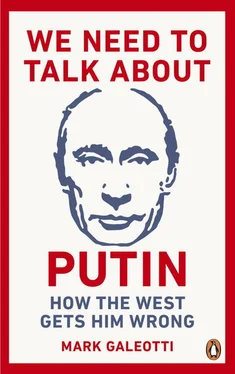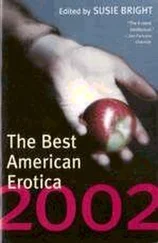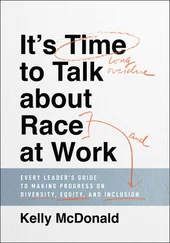Mark Galeotti
WE NEED TO TALK ABOUT PUTIN
WHY THE WEST GETS HIM WRONG
‘Putin is a nicer person than I am.’
Donald Trump, 2015
7 October 1952 — Born in Leningrad (now St Petersburg)
1964 — Begins to learn judo
1970–5 — Reads Law at Leningrad State University
1975 — Joins the KGB
1983 — Marries Lyudmila Putina (neé Shkrebneva)
1985–90 — Serves in Dresden, East Germany
1990 — Returns to Leningrad and moves onto the KGB’s ‘active reserve’ Assigned to work at Leningrad State University
1991–4 — Works in Leningrad Mayor’s Office (the name St Petersburg is restored in October 1991)
1991 — Formally leaves the KGB
1994–6 — First deputy mayor of St Petersburg
1996 — Moves to Moscow after the electoral defeat of Mayor Anatoly Sobchak
1996–7 — Deputy head of the Presidential Property Management Directorate
1997–8 — Deputy head, then first deputy head of the Presidential Administration
1998–9 — Director of the Federal Security Service
1999 — Prime minister
1999 — Start of the Second Chechen War
2000–4 — First presidential term
2003 — Arrest of Mikhail Khodorkovsky
2004–8 — Second presidential term
2008–12 — Serves as prime minister under Dmitry Medvedev
2008 — Invasion of Georgia
2011 — Medvedev nominates Putin for the presidency
2012–18 — Third presidential term
2011–12 — Bolotnaya Square protests against election rigging
2014 — Sochi Winter Olympics
Annexation of Crimea
Intervention in Donbas
2014 — Divorces Lyudmila
2015 — Intervention in Syria
2018–24? — Fourth presidential term
Andropov, Yuri – The formidable KGB chief and then Soviet leader, whom Putin appears to idolise but not understand.
FSB – The Federal Security Service, the main internal counter-intelligence and security agency that succeeded the KGB.
FSO – The Federal Protection Service, the small army of bodyguards, Kremlin riflemen, food tasters and phone tappers, whose job is to keep Putin and the rest of the government safe and happy.
Gorbachev, Mikhail – The last Soviet leader, who reformed the USSR out of existence and appears in many ways to embody precisely what Putin is not.
GRU – The Main Intelligence Directorate, the military intelligence agency.
Ivanov, Sergei – The urbane KGB veteran who was Putin’s chief of staff and was regarded as a potential successor, but took semi-retirement in 2016.
Kabayeva, Alina – The Olympic gold medal-winning rhythmic gymnast rumoured to be Putin’s current lover.
Kadyrov, Ramzan – An unpredictable and violent man who professes loyalty to Putin while running the Chechen Republic as a virtually independent fiefdom.
KGB – The Committee of State Security, the all-encompassing Soviet domestic security and foreign intelligence service.
Kudrin, Alexei – A long-term associate of Putin’s, once a friend and token economic liberal in his government, now somewhat estranged.
Medvedev, Dmitry – Putin’s long-suffering prime minister, less his colleague and more his gopher.
Navalny, Alexei – The main opposition figure today, an anti-corruption campaigner who uses the Internet to bypass the Kremlin’s efforts to keep him off television.
Patrushev, Nikolai – Secretary of the Security Council, former head of the FSB, and a man who makes Putin look like a moderate.
Presidential Administration – The most powerful institution in Putin’s Russia, in effect his government-above-the-government.
Prigozhin, Yevgeny – A man who has done well by doing whatever Putin needs doing. He is known as ‘Putin’s chef’ because he came to know him when he ran a restaurant in St Petersburg; his companies still provide food for the Kremlin and many government agencies.
Roldugin, Sergei – A cellist and childhood friend of Putin’s who is now thought to be worth hundreds of millions of pounds.
Rotenberg, Arkady and Boris – Childhood friends and judo sparring partners of Putin’s, who have done very well in business under his rule.
Sechin, Igor – Head of the oil firm Rosneft and Putin’s former deputy; the Western media calls him ‘Russia’s Darth Vader’, but no one there would dare.
Shoigu, Sergei – Defence minister since 2012, and perhaps the most powerful and influential figure within the government who didn’t get to that position by being a friend of Putin’s.
Sobchak, Anatoly – Putin’s old professor at law school and the first democratically elected mayor of St Petersburg, who appointed him as his deputy.
Surkov, Vladislav – Putin’s former political technologist and the impresario behind his fake political system, now unofficial boss of south-eastern Ukraine.
SVR – The Foreign Intelligence Service, Russia’s main espionage agency.
Zolotov, Viktor – Putin’s former chief bodyguard, now head of the National Guard, a thuggish loyalist through and through.
Introduction: Why We Need to Talk About Putin
White Rabbit in Moscow is a quintessentially ‘new Russian’ restaurant. Under a glass dome above a glitzy shopping centre close to the Stalinist Gothic tower of the Ministry of Foreign Affairs, it is the kind of place where special little chairs are placed next to female diners for their handbags, where the (hefty) bill arrives inside a matryoshka nesting doll and where the idea of a fusion of traditional Russian and international cuisine runs to pine-flavoured ice cream. I’m too miserly and too plain in my tastes to be a fan, but it’s flamboyant and prestigious, a place at which to be seen. I shouldn’t have been surprised that, when invited to choose a place for lunch, a former official of the Presidential Administration (Vladimir Putin’s chancery and the most powerful institution in Russia) would pick White Rabbit. Even an overpriced meal and lots of – naturally – Crimean wine was not enough to get him to be really indiscreet, but one of the more revealing parts of the conversation was when he launched into a lengthy and moderately profane diatribe about the West’s continued misunderstanding of ‘the boss’. ‘Seriously, I read some of the shit in your newspapers, that your politicians say, that your “experts” write, and I just don’t know where they get it. No wonder we’ve got into the mess we’re in now. And you know what?’ He waved an almost-empty glass and frowned at me as if I were a representative of the entire Western journalistic, political and pundit class. ‘It made my job harder.’ How? ‘What kind of relations can we have with you all, so long as you don’t really see us, you don’t hear us? So long as you read whatever you want into the president’s every word and his last fart. My job was to try and communicate, but it didn’t matter what we said, what we put into the boss’s speeches, everyone just assumed they knew what we really meant, whatever we actually said. Everyone thinks they know Vladimir Vladimirovich.’
We need to talk about Putin. We really do. Not just because he is, like it or not, one of the most important people on the planet, and nor because of the impact of the geopolitical struggle he is waging with the West, with bluster and bluff, memes and money. It is also because he has become a global symbol, which everyone defines in their own way. As the irate and two-thirds-drunk official suggested, he is like a Rorschach inkblot test used by psychologists: the splash of pigment is deliberately ambiguous; what we read into it says more about what is going on in our heads than what is on the paper.
Читать дальше












